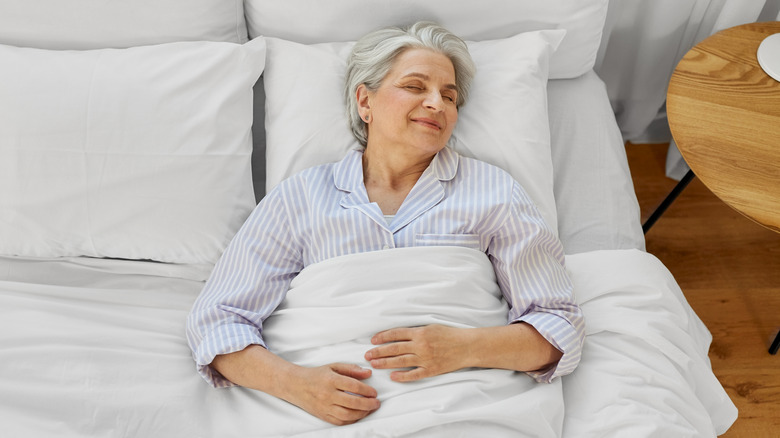Study Reveals The Optimal Amount Of Sleep For People Over 40
Science shows that the amount of sleep we need to maintain our health varies by age. According to the US Centers for Disease Control and Prevention (CDC), infants up to 1-year-old require the greatest amount of sleep — as much as 16 hours a day. But how do these numbers change as we grow older and how exactly are they measured?
The CDC suggests that older adults should get between 7 and 9 hours of sleep nightly. Now, a new longitudinal study published in Nature Aging has narrowed that number down even further. Researchers examined the relationship between sleep and its impact on cognitive function and mental health in roughly 500,000 older European participants. Study author Barbara Sahakian discussed the aim of the study via HealthDay. "Finding ways to improve sleep for older people could be crucial to helping them maintain good mental health and well-being and avoiding cognitive decline, particularly for patients with psychiatric disorders and dementias," Sahakian told the news source.
Avoid less than or more than 7 hours of sleep nightly
A series of "thinking" tests revealed that cognitive and mental performance was at its best in participants in their late 30s to early 70s who received 7 hours of sleep, according to HealthDay. Conversely, test performance was worse in those who received less than or more than 7 hours of sleep each night, as measured by processing speed, visual attention, memory, and problem-solving ability. Additionally, these individuals were also found to be more susceptible to mental health conditions, such as anxiety and depression.
Not only that, but brain imaging technology revealed a link between sleep and structural brain changes, particularly in regions responsible for memory and cognitive processing, such as the precentral cortex and hippocampus (via Nature Aging). Participants who under-slept or overslept beyond 7 hours experienced greater structural changes, potentially increasing their risk for cognitive decline.
While sleep duration cannot definitively be deemed causation for mental decline in older adults, study author Jianfeng Feng identified a possible correlation in a news release. "While we can't say conclusively that too little or too much sleep causes cognitive problems, our analysis looking at individuals over a longer period of time appears to support this idea," Feng said, per HealthDay.


